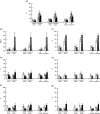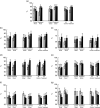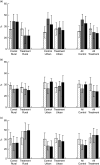The impact of a conditional cash transfer programme on determinants of child health: evidence from Colombia
- PMID: 26917239
- PMCID: PMC10271116
- DOI: 10.1017/S1368980016000240
The impact of a conditional cash transfer programme on determinants of child health: evidence from Colombia
Abstract
Objective: Conditional cash transfer (CCT) programmes provide income to low-income families in return for fulfilling specific behavioural conditions. CCT have been shown to improve child health, but there are few systematic studies of their impact on multiple determinants of child health. We examined the impact of a CCT programme in Colombia on: (i) use of preventive health services; (ii) food consumption and dietary diversity; (iii) mother's knowledge, attitudes and practices about caregiving practices; (iv) maternal employment; and (v) women's empowerment.
Design: Secondary analysis of the quasi-experimental evaluation of the Familias en Accion programme. Children and families were assessed in 2002, 2003 and 2005-06. We applied a difference-in-differences approach using logistic or linear regression, separately examining effects for urban and rural areas.
Setting: Colombia.
Subjects: Children (n 1450) and their families in thirty-one treatment municipalities were compared with children (n 1851) from sixty-five matched control municipalities.
Results: Familias en Accion was associated with a significant increase in the probability of using preventive care services (OR=1·85, 95 % CI 1·03, 3·30) and growth and development check-ups (β=1·36, 95 % CI 0·76, 1·95). It had also a positive impact on dietary diversity and food consumption. No effect was observed on maternal employment, women's empowerment, and knowledge, attitudes and practices about caregiving practices. Overall, Familias en Accion's impact was more marked in rural areas.
Conclusion: CCT in Colombia increase contact with preventive care services and improve dietary diversity, but they are less effective in influencing mother's employment decisions, empowerment and knowledge of caregiving practices.
Keywords: Conditional cash transfer programmes; Health; Income; Intervention; Nutrition; Poverty.
Figures


 , 2002 (baseline);
, 2002 (baseline);  , 2003 (first follow-up);
, 2003 (first follow-up);  , 2005–06 (second follow-up). Values are percentages with their 95 % confidence interval represented by vertical bars, or means with their standard deviation represented by vertical bars (b)
, 2005–06 (second follow-up). Values are percentages with their 95 % confidence interval represented by vertical bars, or means with their standard deviation represented by vertical bars (b)
 , 2002 (baseline);
, 2002 (baseline);  , 2003 (first follow-up);
, 2003 (first follow-up);  , 2005–06 (second follow-up). Values are percentages with their 95 % confidence interval represented by vertical bars
, 2005–06 (second follow-up). Values are percentages with their 95 % confidence interval represented by vertical bars
 , 2002 (baseline);
, 2002 (baseline);  , 2003 (first follow-up);
, 2003 (first follow-up);  , 2005–06 (second follow-up). Values are percentages with their 95 % confidence interval represented by vertical bars
, 2005–06 (second follow-up). Values are percentages with their 95 % confidence interval represented by vertical bars
 , 2002 (baseline);
, 2002 (baseline);  , 2003 (first follow-up);
, 2003 (first follow-up);  , 2005–06 (second follow-up). Values are percentages with their 95 % confidence interval represented by vertical bars, or means with their standard deviation represented by vertical bars (d)
, 2005–06 (second follow-up). Values are percentages with their 95 % confidence interval represented by vertical bars, or means with their standard deviation represented by vertical bars (d)References
-
- Barham T & Maluccio JA (2009) Eradicating diseases: he effect of conditional cash transfers on vaccination coverage in rural Nicaragua. J Health Econ 28, 611–621. - PubMed
-
- Castineira BR, Nunes LC & Rungo P (2009) The impact of conditional cash transfers on health status: the Brazilian Bolsa Familia Programme. Rev Esp Salud Publica 83, 85–97. - PubMed
-
- Gaarder MM, Glassman A & Todd JE (2010) Conditional cash transfers and health: unpacking the causal chain. J Dev Effect 2, 6–50.
-
- Attanasio O, Oppedisano V & Vera-Hernández M (2015) Should cash transfers be conditional? Conditionality, preventive care, and health outcomes. Am Econ J Appl Econ 7, 35–52.
-
- Leroy JL, Ruel M & Verhofstadt E (2009) The impact of conditional cash transfer programmes on child nutrition: a review of evidence using a programme theory framework. J Dev Effect 1, 103–129.
MeSH terms
Grants and funding
LinkOut - more resources
Full Text Sources
Other Literature Sources
Medical
Research Materials

